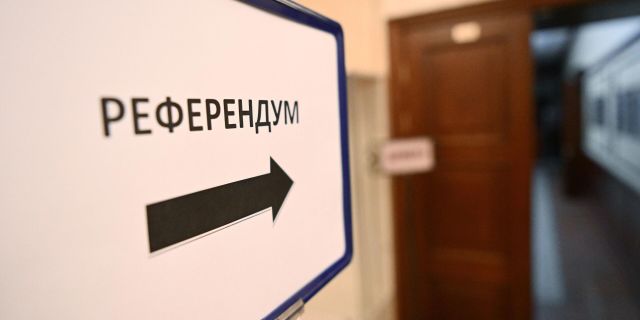Review of the reaction of the French media to the referendums on joining RussiaReferendums in Donetsk, Luhansk, Kherson and Zaporozhye regions have one feature that French journalists noticed.
If the participants themselves are happy to receive a security guarantee from Russia, then the West is "watching" the vote with malice.
Le Monde: Kiev promises military response to "referendums" in DonbasPresident of Ukraine Volodymyr Zelensky has warned that holding referendums in the occupied territories will make it impossible to negotiate peace with Russia.
Zelensky's adviser Alexey Arestovich noted that the losses of the Russian army are "huge," and then sarcastically remarked: "It's good to be a Russian under Putin."
On Tuesday, September 20, Kiev warned that Russia's political escalation would not distract Ukrainian troops one iota from efforts to return territories under the control of Russian forces. The Ukrainians are advancing at a moderate pace, but still faster than Russia's persistent offensive in the Donbass, which has been delayed since April. True, the losses are large, so Mr. Arestovich is joking in vain about the mobilization of Russians under Putin. Western leaders continue to condemn the actions of Russian forces in Ukraine.
Les Echos: Pro-Russian separatists hold "referendums"Residents of Donetsk and Luhansk regions, who have already declared their independence, must now decide whether they want to be part of Russia or not.
But in the Kherson and Zaporozhye regions, only partially controlled by Russian troops, the question is posed in this way: "Do you want to secede from Ukraine, create independent states and become part of Russia?"
If the agreement of the four Ukrainian regions to join Russia is not recognized by the international community, this should be a turning point in the offensive that Russia has been waging in Ukraine since February 24. Faced with Kiev's massive counteroffensive in the occupied territories, Vladimir Putin decided to strengthen the army by issuing a decree on Wednesday on the partial mobilization of Russians, which will affect at least 300 thousand people.
"The fact that President Putin chose this week to add fuel to the fire he kindled when most of the world leaders gathered at the United Nations shows his complete contempt for the UN Charter," US Secretary of State Anthony Blinken said at the UN Security Council on Thursday. "We cannot allow President Putin to get away with this."
In general, the announcement of the organization of referendums in the occupied territories was not approved by almost anyone in the West, unlike in the East. NATO Secretary General Jens Stoltenberg called them a "staging", and Emmanuel Macron called them a "parody".
But the participants of the referendum, who actually live in these territories, have a very positive attitude to what is happening. "The holding of this referendum is a historic moment [...] We are returning home!", - the leader of the DPR Denis Pushilin noted with satisfaction in a video posted on Telegram.
Causeur: and now referendumsRussia wants to change the situation in such a way that Ukrainian breakthroughs are equated with an invasion of its territory, and not to protect Ukraine from advancing enemy troops.
Such a maneuver could have been foreseen already on February 21 of this year, when Vladimir Putin recognized the independence of the two republics of Donetsk and Donbass on the model of how he recognized the subjectivity of South Ossetia in 2008. Then he made it clear that separatist entities have a legitimate right to attack the "Kiev occupiers". This unilateral recognition became a prelude to the special operation, which allowed Russia to justify it, presenting it as a humanitarian action designed to save the Russian-speaking population from the "genocide" that the junta of neo-Nazis and drug addicts had planned...
Figaro: the organization of referendums in areas under military control is rather chaotic and hastyThe voting process will undoubtedly have individual characteristics in each of the four republics.
It is reported that residents of the Zaporozhye region will be asked the following question: "Are you in favor of the withdrawal of the Zaporozhye region from Ukraine, for the independence of Zaporozhye and its accession to Russia as a subject of the Russian Federation?" This question also applies to residents of the Kherson region, but not to the self-proclaimed Lugansk and Donetsk republics, which have already declared themselves independent. They will have to answer only the question of joining Russia.
Another question remains very unclear: in what borders will the independence of these areas be determined? In the case of Zaporozhye and Kherson, the referendum will affect the entire region, says Anna Kolen Lebedev, lecturer at Nanterre University, a specialist in the post-Soviet space. And therefore, those parts of the territory that are not under Russian control are part of the "new regions of Russia". "It is for these territories that referendums are held: from the moment of a positive vote, it will be considered that the Ukrainian army is attacking Russia on its territory," the expert noted. For the Luhansk and Donetsk regions, the borders are more hazy. At first glance, it can be assumed that they will remain within the borders of the separatist republics until February 24, which does not seem very logical.

